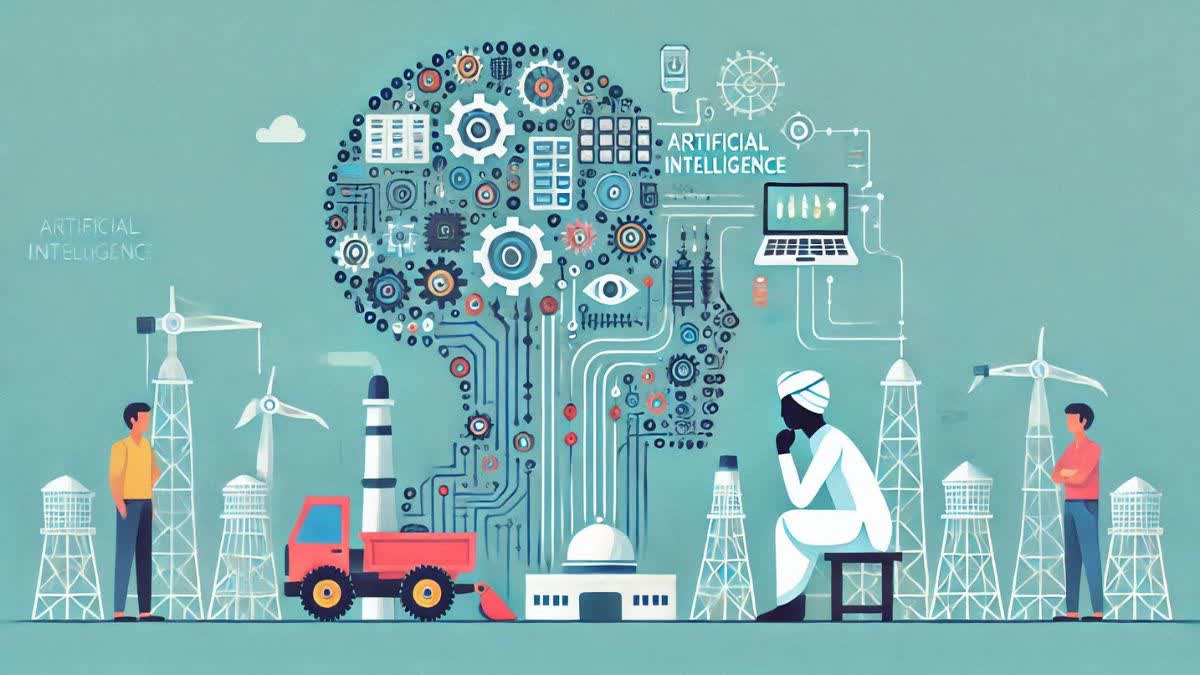New Delhi: As we stand on the cusp of a new era, the world is being reshaped by transformative technologies like Artificial Intelligence (AI), robotics, biotechnology, and quantum computing. This new phase, often called the "Intelligent Age," promises to redefine the ways in which we live, work, and interact with the world. The potential to address global challenges and unlock unprecedented opportunities is immense, but it requires collective effort and strategic foresight. India, with its growing economy and commitment to digital innovation, is positioned at the heart of this transformation.
India's Economic Position in the Intelligent Age
India is currently the fifth-largest economy globally, with a Gross Domestic Product (GDP) nearing $4 trillion. It has experienced robust growth, maintaining a stable rate of 7-8 per cent, despite global uncertainties. This growth trajectory, combined with deepening economic reforms, a strong demographic dividend, and an expanding consumer base, makes India a key player on the global economic stage.
India's advancement in the digital space has been particularly remarkable. The country's rapid strides in Digital Public Infrastructure (DPI) have set a global example, showcasing how technology can be harnessed for economic growth and development. However, to sustain this growth and lead in the Intelligent Age, India must continue to prioritise investments in next-generation infrastructure, particularly in AI, semiconductors, and quantum computing.
Dr Karnnika A Seth, Advocate & Cyberlaw Expert told ETV Bharat, "AI is being leveraged in agriculture, healthcare, smart cities, and various other sectors. India is certainly a world leader in the creation of AI and its deployment. We are mindful of the fact that AI needs to be adopted responsibly, and our policies reflect this in the blueprint. The proposed Digital India Act focuses on regulating high-risk systems and facilitates innovation through minimum regulation on low-risk AI systems. In my personal view, a separate AI law will need to be enacted. To that end, I voluntarily drafted a proposed AI law for India in support of the G20 summit in India."
India's Vision for AI and Technology Regulation
India's approach to AI is multifaceted, balancing innovation with ethical considerations and responsible deployment. The government’s commitment to responsible AI use is reflected in its policy frameworks, such as the Digital India Act, which aims to regulate high-risk AI systems while encouraging innovation in low-risk areas. As Karnika highlighted, the development of a distinct AI law for the country is vital to ensure that AI technologies are aligned with India’s broader socio-economic goals.
India's focus on developing regulatory frameworks that encourage innovation while minimising risks has positioned it as a leader in the global AI space. The proposed regulations around AI aim to address critical issues such as data privacy, accountability, and bias while fostering a conducive environment for AI startups and enterprises to thrive.
India's Strategic Technological Advantages
One of India's key strengths in the Intelligent Age is its vast population, which generates massive amounts of data daily. This data, when harnessed responsibly, has the potential to drive innovation and open new economic avenues. In fact, India has the opportunity to set global standards for data governance and ethics, given its large and diverse population, coupled with a strong push toward digital transformation.
Dr Charru Malhotra, a technology policy expert and Professor (e-Governance and ICT) at the Indian Institute of Public Administration, told ETV Bharat, "At ENRich 2024, Minister Hardeep S Puri said AI is instrumental in realizing a 'Viksit Bharat' by 2047, and AI adoption can generate Rs 33.8 Lakh Cr of economic value in the country by 2030. This growth has to be fueled by both private-sector investments and government initiatives."
India’s robust start-up ecosystem, with over 110 unicorns and a rapidly growing number of tech startups, places the country in a unique position to become a global innovation hub. With targeted investments in emerging technologies and a focus on fostering talent through educational programs in AI, robotics, and data science, India can leverage its human resources to drive forward in the Intelligent Age.
India's Semiconductor Industry: A Crucial Strategic Focus
The growing demand for AI, the Internet of Things (IoT), and 5G technologies means that semiconductors will play a pivotal role in the future economy. As the global tech supply chain faces disruptions, India's semiconductor industry has become more crucial than ever. The Indian government has already initiated the India Semiconductor Mission, which aims to position India as a global player in semiconductor manufacturing.
To strengthen its position in this field, India must not only attract global semiconductor giants but also focus on fostering homegrown companies capable of competing at the global level. With targeted investments, talent development, and international collaborations, India can become a leader in semiconductor production, providing the foundation for many of the technologies that will drive the Intelligent Age.
AI Across Sectors: The Impact on Indian Industries
The adoption of AI is reshaping industries across India. Key sectors such as healthcare, education, manufacturing, retail, and banking are leveraging AI to enhance efficiency, reduce costs, and improve customer experiences.
Healthcare: In healthcare, AI is being used for diagnostic accuracy, predictive analytics, and personalised treatment plans. For instance, Apollo Hospitals have employed AI to improve tuberculosis detection through chest X-rays. The potential of AI in healthcare is immense, although challenges such as data privacy and ethical concerns remain to be addressed.
Mobility: Similarly, AI's role in smart mobility, including autonomous vehicles and predictive engine monitoring, is set to revolutionise transport and logistics. However, the adoption rate in these sectors remains relatively low in India, indicating that further investments in infrastructure and policy support are needed.
Manufacturing: AI is also transforming manufacturing, with Indian factories increasingly integrating AI for predictive maintenance, quality assurance, and supply chain management. The manufacturing sector alone has seen a 20 per cent increase in AI adoption over the past two years, and it is expected to grow further, reaching a market size of Rs 12.59 billion by 2028.
Marketing: AI's impact is also visible in marketing, where 80 per cent of marketers report significant improvements in delivering personalised customer experiences through AI technologies. Additionally, AI adoption in banking and financial services has surged, with applications ranging from robo-advisory services to algorithmic trading.
Addressing Challenges in AI Adoption
Despite the rapid adoption of AI, Indian businesses face several challenges. A significant concern is the difficulty in selecting the right AI technologies, with many companies still struggling to adopt appropriate AI solutions. Moreover, the lack of a clear AI strategy, governance tools, and ethical AI policies presents a barrier to widespread adoption.
India also faces a talent gap in AI. According to NASSCOM, India currently has 416,000 AI professionals, while the demand is projected to reach 629,000 by 2026. Bridging this gap requires a concerted effort to invest in AI education and vocational training.
Moreover, the potential for AI to displace jobs poses a challenge for policymakers. A report by the World Economic Forum estimates that AI could replace up to 85 million jobs by 2025, underscoring the need for workforce reskilling and social safety nets.
India as a Global Leader in the Intelligent Age
As India continues to embrace the opportunities offered by AI and emerging technologies, it has the chance to redefine its position in the global economy. The government’s focus on innovation, responsible AI deployment, and building a robust digital infrastructure places India in an enviable position to lead in the Intelligent Age.
In the words of Dr Malhotra, "India provides a perfect 'playground' for enterprises globally to develop scalable solutions which can be easily implemented in the rest of the developing countries." India's unique combination of a large, tech-savvy population, strategic initiatives like the India Semiconductor Mission, and a vibrant startup ecosystem makes it a key player in shaping the future of the global economy.
As India looks to the future, the integration of AI and technology into its economic and social fabric will not only drive growth but also help achieve the vision of a "Viksit Bharat" (developed India) by 2047. With the right investments in infrastructure, education, and policy frameworks, India can position itself as a global leader in the Intelligent Age, benefiting not only its own people but also contributing to the global effort to harness technology for shared human progress.



